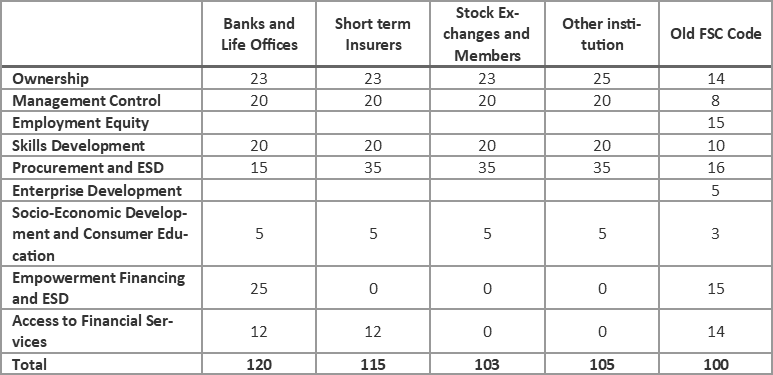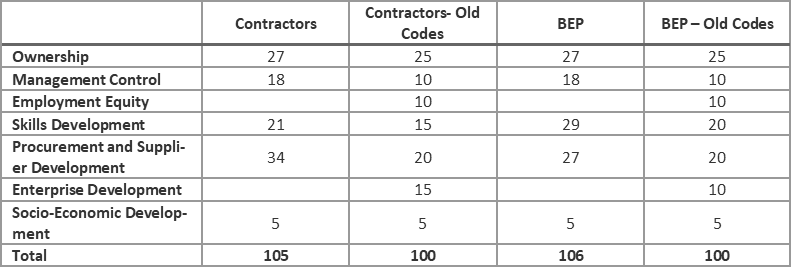The amended Financial Services Sector (FSC) and Construction Sector Codes were gazetted on 1 December 2017 in Government Gazette 41287.
Both codes have been gazetted for immediate adoption. A company with a December year-end and falling under one of these codes must apply the amended codes with two-weeks’ planning. The dti’s argument is that companies can plan on the drafts or the Amended General Codes but this takes no account of differences between the drafts and final gazetted documents as well as differences between the gazetted sector code and the Amended Codes of Good Practice (CoGP). The construction sector has been scored under the amended CoGP since February 2016 which limits the impact. However, it has a significant impact for the Financial Sector.
Financial Services Sector
The amended codes can be downloaded here. The points per element are summarised as follows. A comparison to the old codes is made:

The following are key points noted on a review of the FSC code in addition to points noted from media reports since the date of gazetting:
- The Gazetted code is not final. It will be updated based upon the reports of public hearings by Parliament’s Finance and Trade and Industry Committees. In addition, new targets under Empowerment Financing will be set in January 2018. Why the rush to gazette when there are changes due one month after the gazette was issued?
- CEOs will be made responsible for the B-BBEE activities of the company.
- The BEE Commission is expected to publish fines for non-compliance with the Codes by June 2018.
- There is discussion that state assets must be managed by entities which are 51% Black Owned.
- There is an additional Priority Element. Companies which are not exempted from compliance with Empowerment Financing must meet a 40% sub-minimum for this element or be discounted a level on their scorecard.
- There are two criteria for a Qualifying Small Financial Institution (or QSFI) to qualify as black owned:
– More than 50% black owned based on equity deals in place before the gazetting of the amended FSC codes.
– More than 51% black owned based on equity deals after the gazetting of the amended FSC codes
- Points per BEE recognition level must be adjusted based on the finance industry sector in which the company operates. It is based on the COGP scorecard which is out of 109 points. This means that a level 2 for a Bank is 95/109 x 120 or 104.59.

- Each financial institution must be measured on its own even if it is part of a group. This is unless advance approval is received from the Financial Sector Charter Council.
- Each Financial Institution must report annually to the Financial Sector Charter Council. The council reserves the right to name and shame companies not reporting as required. If a company does not report to the council, it will be automatically discounted a level immediately following verification. This appears to be in addition to any discounting resulting from not meeting all priority elements.
- It appears that the modified flow-though can be applied more than once, which is a departure from the Amended CoGP as the codes allow:
– Existing B-BBEE deals if black people have flow-through participation of more than 50% in the chain of ownership then that participation can be treated as 100% once in that chain of ownership.
– BEE deals after Gazetting if black people have flow-through participation of more than 51% in the chain of ownership. In this case, participation can be treated as 100% once in that ownership structure.
- There are points available for African managers under Senior, Middle and Junior Management under Management Control. This was discussed in the draft of the code. Demographics are not applied to Management Control. This is a departure from both the draft codes and the amended CoGP.
- Skills development is management-level driven. There are points available for African managers which was not covered in the draft.
- Levels of management can be combined, which was not in the draft.
- Category F training is not limited.
- No mention is made of Mandatory Sectoral Training.
- The major concern here is the large target spend on Skills Development. If you add the percentage of the leviable amount required from each level you get to 18% of leviable amount of which 9% is on black females.
Construction Sector Code
The amended codes can be downloaded here. The points per element are summarised as follows. There is a comparison to the old codes:

The following are key points noted on a review of the Construction Sector code:
- Companies with Certificates must report to the Construction Sector Charter Council giving the verified scorecard. Verification agencies must ensure that their confidentiality requirements do not prevent them from supplying the required information.
- Companies are only measured against South African Operations.
- There are specific requirements for Exempted Micro Enterprises (EME):
– Construction companies with a turnover less than R10 million,
– BEP with turnover less than R6 million,
– Less than 30% black ownership will be an automatic level 5,
– Between 30% and 51% black ownership will be an automatic level 4,
– Thereafter the same levels as per the amended CoGP,
– EME with automatic levels of between 1 and 5, and turnover of more than R1.8 million for BEP and R3 million for contractors, must meet a target at least 40% of the QSE skills development target or be automatically discounted a level, –
- EME with less than 100% black ownership can enhance their B-BBEE levels by:
– Being scored on the QSE scorecard, or
– Scoring full points (excluding bonus points) for the QSE Skills Development scorecard. Such companies will be enhanced by 1 level, or
– Scoring full points for the QSE Supplier Development Expenditure scorecard. Such companies will be enhanced by 1 level.
– If an EME gets full points for Skills Development and the Supplier Development as discussed above, their score will be enhanced by 2 levels. This is only available to EME which do not score on the full QSE scorecard.
- There are specific requirements for Qualifying Small Enterprises (QSE):
– Construction companies with turnover between R10 and R50 million,
– BEP with turnover between R6 and R25million,
– Less than 30% black ownership will be an automatic level 5,
– QSE with automatic levels of 1 and 2 must meet a target of at least 40% of the QSE skills development target or be automatically discounted a level
- QSE with more than 51% and less than 100% black ownership can enhance their B-BBEE levels by:
– Scoring full points (excluding bonus points) for the QSE Skills Development scorecard, or
– Scoring full points for the QSE Preferential Procurement and Supplier Development Expenditure scorecard.
This is only available to QSE which do not score on the full QSE scorecard.
- The dti will determine a nominal fee to be charged by Verification Agencies to verify EME and QSE compliance with the 40% sub-minimum requirement for Skills Development. This fee will be posted on the Construction Sector Charter Council website. VA who are prepared to offer their services at this nominal fee will post their contact details on the Charter Council Website. Large construction companies are encouraged to pay such fees as part of their Supplier Development programmes.
- Many elements have changing targets after 4 years, for example Ownership starts at 32.5% and moves to 35% in year 4.
- The following were noted under Management Control:
– There are bonus points for exceeding targets on black directors as well as for black professionals and youth.
– Remuneration parity is important. Paragraph 3.7.1 of statement CSC 200 states: “The Measured Entity must strive for parity in remuneration between race groups and gender at all management levels. To this end the Measured Entry must provide full payroll access together with a copy of the Payment Parity report EEA4 to the Verification Agency during the verification. In the absence of such, the staff management levels will be declined by the verification Agency.”
- Skills Development
– Race and Gender demographics are applied with additional recognition for African staff.
– It is also management-level driven.
– Adjusted recognition for Gender is applied.
– Mandatory Sectoral Training is defined.
– Category F and G training is limited to 35% of total skills development expenditure.
– Learnerships include category A training.
– There are bonus points for black people registered with professional industry bodies’
- Under procurement, measurement is against:
– Companies which are 51% black owned,
– Companies which are 35% black women owned.
- There is no enterprise development. Instead there is a new priority element for Supplier Development Programmes. This will be covered in another mailer.
This is my last mailer for 2017. I wish you all a peaceful, restful break over December. If you are travelling, please be careful and safe on the roads.
If you have any B-BBEE consulting needs, please contact either Charlene Skipp on [email protected] (083 780 7209) or me on [email protected] (083 440 2130). Charlene and I can redirect queries on Employment Equity consulting.
Kind regards,
Global Business Solutions


